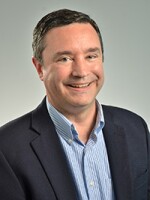Dan Hesse retired after seven years as CEO of Sprint in August 2014, he vowed to take at least a year "completely off."
The year has come and gone — and Hesse is busy again ... but it's a different kind of busy.
"I'd been accused by many people of being a serial workaholic," Hesse says. "I tried to have a balanced life, but I really focused on being the best leader and mentor I could be. I wanted to take some time to be the best father, husband, son and friend that I could be."
And Hesse says that is exactly what he has done. In an interview on KCUR's Up to Date, Hesse told host Steve Kraske that for the past 18 months, he has spent a lot of time attending his son's sporting events and traveling to music festivals and wineries. But he has also ramped up his speaking schedule — he has upcoming gigs at Notre Dame and the Massachusetts Institute of Technology — and joined two corporate boards.
"When I stopped working, I realized I was carrying around a lot of stress," Hesse says. "Now I live very much in the moment."
Many credited Hesse with improving Sprint's customer service and rebuilding its wireless network almost from scratch. Magazines and employees declared Hesse as one of the nation's most successful and popular CEOs. For his last two years as CEO, Sprint had the top total shareholder return among S&P 500 companies. But some critics have said Sprint failed to realize its potential under Hesse's leadership and that its perpetual underdog status — in terms of market share and company self-image — was largely unchanged by the time he retired.
Hesse remains in the news as an observer of trends in technology, business ... and the Kansas City Royals. Forbes magazine recently interviewed him on what corporate leaders could learn from his hometown world champion baseball team. Specifically, he cited the Royals' willingness to take a long-term view ("People forget that Dayton Moore's first eight years were losing seasons") and the players' knowledge that team leaders really cared about them as people and not just as players.
"There are a lot of those examples that can be directly correlated to what makes companies and CEOs successful," Hesse says.
Hesse also continues to follow industry trends in wireless technology, and he says growth there has really come as wireless devices have evolved through three phases. The first was the use of devices for talking to people, though he acknowledged that his teenage sons rarely use their phones for that purpose any more. The second was the addition of internet browsing, which he says was "when peanut butter met chocolate." But even more growth is emerging now in a third phase, called "the internet of things."
"That’s where people really aren’t in the equation at all," Hesse says. "It’s things talking to things — it’s your smartwatch, it’s your Fitbit, it’s meters, it’s connected cars, it’s connected medical devices. Cisco estimates there are 25 billion things connected to the internet right now, and it will be 50 billion in five years."
Hesse also turned to questions of cybersecurity, addressing the recent confrontation between Apple CEO Tim Cook and the Justice Department over retrieving encrypted data from an alleged terrorist's mobile phone. Hesse recounted a speech he gave last year in which he posed the question: "Which CEO is more patriotic, the one who provides all of the information the government requests to help catch a criminal or prevent a terrorist attack, or the CEO whose company creates tools that make it difficult for law enforcement or the government to acquire a customer’s information, believing protecting civil liberties is a higher calling?”
"I think both are right in many respects; both are patriotic," Hesse says. "I think it’s good that Tim Cook is taking the position that he is. Because all of what’s happening now is based on the All Writs act of 1789. This was over 200 years ago and technology has changed so much. This was before the telegraph was invented, for crying out loud."
But Hesse's life after Sprint isn't completely consumed with hard-hitting analysis of matters of national security. He also has been able to focus on another passion of his: Improving audio quality on mobile devices, with the urging of musical legend Neil Young.
"So I get a call on my cell phone — this was maybe six months ago — and, 'Hey Dan, this is Neil Young,'" Hesse recalls. "And the voice sounded familiar because I’m a huge collector of his music, have been for a long time, and I’m thinking it’s a high school or college buddy of mine with a prank. But he goes, 'I’d really like to meet you.'”
It turns out Young knew of Hesse's work collaborating with other corporate leaders to develop new devices that would better store and reproduce the fullness of digital sound.
"He knew I was a missionary around creating better sound in mobile. We’re both vinyl guys, but that’s not where the young generation is. That’s not where they’re going. How can we bring high-quality sound to mobility?
Hesse says Young invited him to discuss their shared passion at the Farm Aid concert last September, where the two hung out in his trailer and backstage.
Brian Ellison is a host/contributor at KCUR. You can reach him at brian@kcur.org or on Twitter, @ptsbrian.




